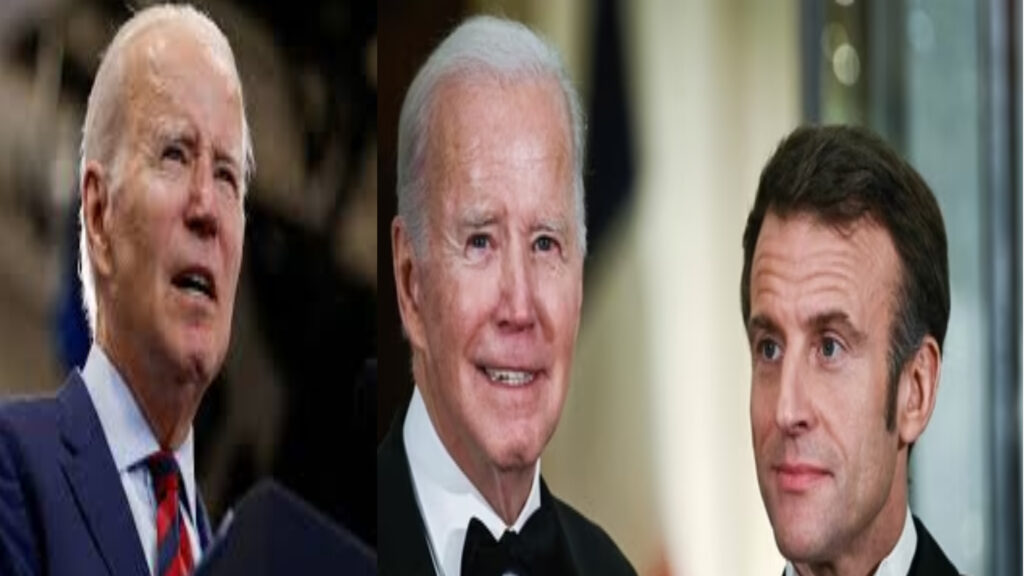In a recent turn of events that has sparked both concern and ridicule, President Joe Biden found himself at the center of controversy following a verbal slip-up that confused current French President Emmanuel Macron with the late Francois Mitterrand, France’s former president who passed away over two decades ago. This incident occurred during a speech in Las Vegas, Nevada, as Biden was rallying support ahead of the state’s primary election.
The 81-year-old U.S. president was recounting his experiences at the G7 meeting held in Cornwall, England, in 2021, where he intended to underscore his message that “America is back” on the world stage. However, in his attempt to convey the interactions he had with world leaders during this summit, Biden mistakenly referred to having a conversation with Mitterrand, the French leader who served from 1981 to 1995, instead of the current President Emmanuel Macron, who has been in office since 2017.
Biden’s narrative aimed to highlight the significance of democracy and the rule of law, drawing parallels between hypothetical scenarios involving breaches of democratic institutions in other countries and the January 6, 2021, Capitol riots in the United States. In his speech, he described a fictional situation posed by the chancellor of Germany about a violent attack on the British House of Commons, using it as a metaphor for the events that transpired at the U.S. Capitol.
The White House, in an official transcript of the speech, acknowledged the error, clarifying that Biden meant to refer to Macron, not Mitterrand. Despite this correction, the gaffe has fueled ongoing debates about Biden’s age and mental acuity, especially as the 2024 presidential campaign season begins to heat up. Critics and detractors have seized upon this moment, as well as previous instances of verbal slips and physical mishaps, as evidence of Biden’s unsuitability for a second term in office.
The reaction on social media was swift and unforgiving, with commentators from various political spectrums mocking the president’s mistake. Some used humor to suggest Biden possesses the ability to communicate with deceased European leaders, while others expressed serious concern about his mental fitness and capacity to lead. The incident has also reignited discussions about the age and health of political leaders, with Biden and his likely future electoral opponent, former President Donald Trump, both in their seventies and facing scrutiny over their physical and cognitive well-being.
Trump, 77, has himself not been immune to similar gaffes, including a recent mix-up involving former Democratic House Speaker Nancy Pelosi and GOP 2024 presidential hopeful Nikki Haley. Such incidents highlight the challenges and pressures faced by aging leaders in the demanding and fast-paced world of politics.
The Biden-Mitterrand confusion serves as a reminder of the complexities and pitfalls of public speaking, particularly for politicians whose every word is scrutinized. It also underscores the importance of clarity and accuracy in communication, especially on the international stage where misunderstandings can have significant diplomatic repercussions.
As the political landscape continues to evolve and the 2024 presidential race looms on the horizon, the incident adds another layer to the ongoing debate about leadership, competency, and the criteria by which voters assess candidates. While some may view these verbal missteps as minor and inconsequential, others see them as symptomatic of larger concerns that warrant serious consideration.
Ultimately, the incident is a moment of reflection for both the public and political leaders, prompting questions about the expectations we hold for those in high office and the nature of political discourse in an era where every statement can be instantly broadcast and analyzed worldwide. As the U.S. navigates these complex political waters, the balance between experience, wisdom, and the physical and mental demands of leadership will undoubtedly continue to be a central theme in the national conversation.
This episode in Biden’s presidency highlights a broader societal challenge: how to respectfully address and navigate the realities of aging while maintaining the high standards required for public service. It brings to the forefront the delicate balance between honoring the contributions of experienced leaders and recognizing when it may be time for new voices and perspectives to emerge. In a rapidly changing world, the ability to adapt, communicate effectively, and connect with a diverse constituency is paramount. The discourse surrounding Biden’s gaffe, while at times divisive, also offers an opportunity for a constructive dialogue on the future of leadership and the qualities most needed in those who guide nations. As the global community faces unprecedented challenges, from climate change to technological disruption, the incident serves as a reminder of the importance of clear, cogent, and dynamic leadership. It underscores the necessity of fostering a political environment where leaders are both capable and cognizant of the immense responsibilities they bear, ensuring that governance remains robust, responsive, and reflective of the people it serves.

